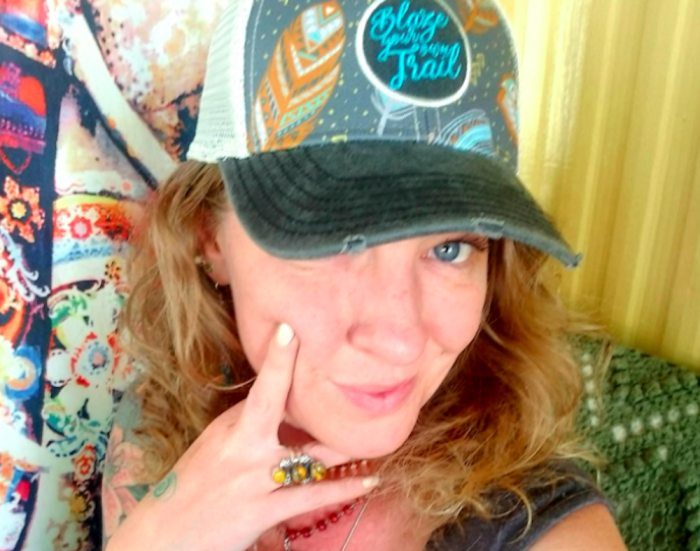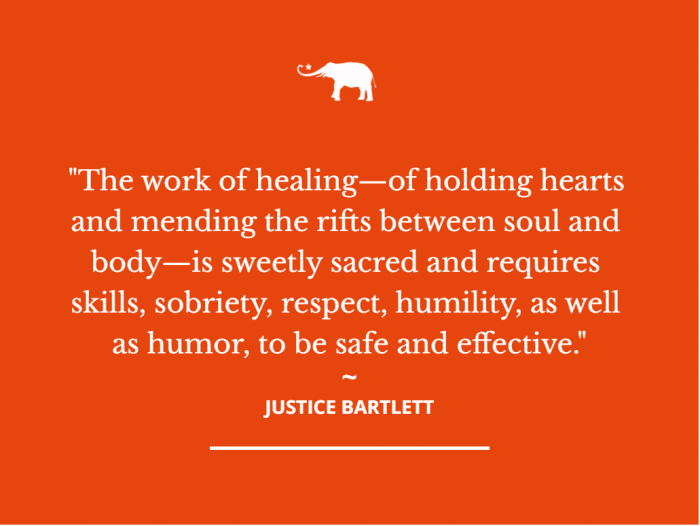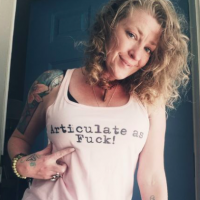I’d love to tell you I gave a single flying f*ck about mantras and moon baths but I can’t.
What I can tell you is that I care.
I care deeply. And because I care, I am dangerous.
I don’t care about proper spiritual attire, titles, or lingo. I don’t care what guru you may have studied under. I don’t care about being high vibe, and I could give a f*ck less for how amber your aura is. These things don’t matter.
What matters is that we practice basic tenets of human decency. What matters is being considerate and embodying common sense, something that is sadly becoming absent from many spiritual communities and practices.
I care about being authentic. I care about being safe. I care about being grounded and, through my own embodied practice, being able to neurologically mirror these states to the people who come to me for support.
I’m not a materialist. There is history, momentum, and archetypal relevance that is often embedded in spiritual rituals. There is also a whole lotta hogwash and dogma.
How do we sort the wheat from the chaff?
True spiritual practice is indistinguishable from living a grounded life based on practical and empathetic human values.
I call myself a witch, a priestess, and wild woman because these are archetypal identities that resonate with our collective consciousness. I also swear like a sailor and will (good-naturedly) make fun of pretty much everything in existence, especially myself.
Some call spiritual practices magical thinking. To a degree it is, or at least can be, but that is why we must engage our minds and our bodies in the service of life and not waste our energy and attention on petty manipulations or ascension-driven dissociation.
“Phenomena must not exceed its practicality.” ~ Clarissa Pinkola Estes
I cannot remember from which of the cantadora’s publications I heard that quote but it spoke to my bones. I say bones, instead of soul, because soul is ephemeral. Bones are solid—material.
The purpose of the spiritual path is to make the material more meaningful, to infuse the mundane with magic. Magic’s meaning, in this regard, must be seen as both organic and alchemical. This has little to do with the supernatural and everything to do with our connection to our humanity and nature.
I will not have people under the auspices of my care become ineffective navel-gazers. No. Engagement with life is required.
Recently I led a retreat for a small group of people in the wilds of Montana where I live. When I set out to create the curriculum, I knew only that we needed as much physical engagement with each other and nature as we did internal meanderings.
As an introduction to the land and each other, I led the group to the water. I invited them to wash their feet, let their cares and sorrows slip into the sun-kissed stream of the Gallatin river. I shared how the valley was sacred to the Natives, a place to rest and restore themselves, and how fighting here was verboten.
As I watched my students play in the ripples, I realized I had a towel in my car and dashed, barefoot, back up the trail to retrieve it. Then I had them sit on a rock as I dried their feet. As I crouched in the frigid water, we exchanged whispers and jokes and one by one I helped each person replace their socks and shoes. Then they insisted on doing the same for me.
True service is never martyrdom, nor is it performative. It is an offering of the heart that leaves us as full as we were before we made it. It does not call attention to itself, but leaves an impression in which we can rest and grow. True service plants a seed that slowly blooms and graces all who behold it.
The world needs us to have our eyes as well as our hearts open.
The phenomenon cannot exceed its practicality. This, too, is the guiding principle for paganism. The goal of witchcraft, as practice, is to form an alliance with the elements and each other. It is to affect—with our consciousness—the workings of the world.
It was an Audible book, where the quote about practicality came from, one of the Sounds True productions. It was most likely Dangerous Old Woman, which, coincidentally, also contained another fabulous articulation regarding danger.
Being dangerous is usually viewed as negative. Yet, there is an older meaning. Being dangerous also speaks of an aura. A dangerous person has the ability to include you within the mantle of their protection.
I am a dangerous woman. My danger arises from instincts, discernment, and from rising from the ashes of my own victimhood.
It is, in part, this forcefield of danger that I carry that makes me good at what I do. My students and clients are safe with me because I am dangerous. Because I am dangerous—and I know it—I can be truly tender. I can drop my guard. I can listen to people’s hurts and bind their wounds without abandoning them or myself.
I will rise in protection for that which I love. I will stand, flaming sword in hand, and rally for right livelihood, innocence, and self-worth. To be dangerous is to hold equally, and with deep reverence, our capacity for creation as well as destruction and to wield those forces with awareness and discrimination.
The work of healing—of holding hearts and mending the rifts between soul and body—is sweetly sacred and requires skills, sobriety, respect, humility, as well as humor, to be safe and effective.
Spiritual bypassing, spiritual materialism, whitelighting, dissociating, victim-blaming, and perpetrators often plague those who seek a spiritual path. Seeing people become more confused, less embodied, and more susceptible to scams and manipulations—when all they want is to heal—sets my wild heart aflame.
Don’t f*ck around in people’s psyche. Don’t mess with mending materials, physical, mental, or emotional, that you, yourself, do not understand. Don’t thoughtlessly trample where you have not actually tread. Don’t f*cking do it.
Yes, I am dangerous. I am also sensitive and silly, spontaneous, and deeply devoted.
As my retreat group and I sat at dinner around a long table, eating loaded baked potatoes and talking sh*t, I casually said to my students, “I come from a long line of priestesses. Yada blada and bleh. So there.” Everyone laughed then we headed out to the campfire to make s’mores and recall our first childhood memories.
We softly spoke the truth, laughed, and burned marshmallows as we held each other’s stories and healed.
We do not need a spiritual pedigree to be of service. We need care, compassion, and a sense of solidarity. We need to learn to walk through the hard, holy and human together.
~













Read 8 comments and reply